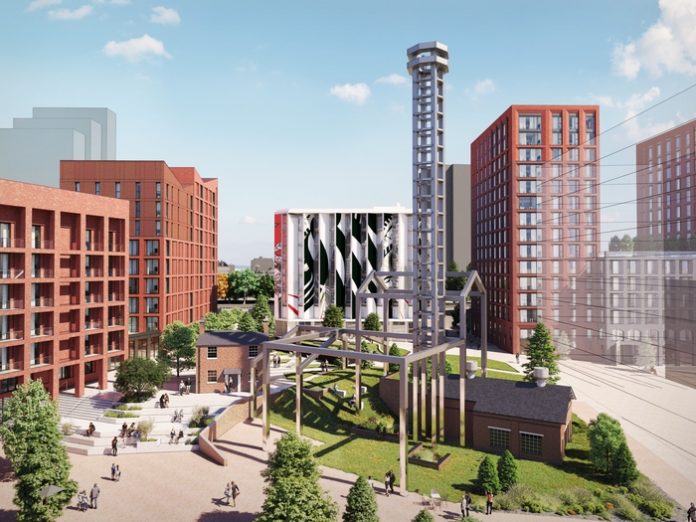National property development and investment company Cole Waterhouse has submitted a full planning application to Birmingham City Council for its 5.11-acre site at Upper Trinity Street in Digbeth, Birmingham.
The developer exchanged contracts on the site last year from multiple landowners and has since undertaken an extensive community consultation programme for a ground-breaking, mixed-use scheme that will create a new cultural, commercial and residential neighbourhood for the city and the Digbeth community.
For over a year Cole Waterhouse has been working closely with Birmingham City Council, neighbouring landowners and planning consultancy Barton Wilmore to bring forward its vision for Upper Trinity Street. The proposed development comprises almost 6,000sq ft of mixed creative, retail, leisure and workspace, and over 900 new homes with a mix of private sale and build to rent apartments that will help to meet the local housing need. Also included in the proposal is a 133-bedroom hotel that occupies a key location overlooking the proposed Skypark on Duddeston Viaduct and a new public park called ‘Pump House Park’; named after the former Victorian Pump House, a vital piece of canal infrastructure and the inspiration for a large new industrial art installation by renowned local artist Tim Tolkien.
The community response to Cole Waterhouse’s plans for Upper Trinity Street has been overwhelmingly positive following a recent public exhibition at The Engine Room in Digbeth. Jez Collins, the project’s local cultural lead, has been working with the team to ensure the proposals support and nurture the area’s heritage and culture.
Commenting on the planning submission Cole Waterhouse CEO Damian Flood said: “We are committed to delivering high quality design which enhance the surrounding environment and community. Our vision is to create a new neighbourhood right in the heart of Digbeth and neighbourhoods need communities, culture and connectivity to thrive and prosper so this has been a driving factor in the development of our plans. We’ve worked really hard to involve the local community as much as we possibly can and look forward to this next stage of the process. Now that the planning application has been made we will be moving into the funding phase of the project whilst we move through the planning process and await a decision.”
Antony Harding planning associate at planning consultancy Barton Wilmore added: “This is an important scheme in Digbeth’s continuing evolution. It’s a site which has largely been forgotten about and unloved for decades. Strategically the scheme is vital as it expands Digbeth’s cultural provision beyond Lower Trinity Street, which is known for the wonderful Digbeth Dining Club, out further beyond to the edge of Bordesley. The residential element within Digbeth is much needed and goes some way to start positively creating communities again and addressing the impact made by the mass building clearance within Digbeth in the 1960s.
“The project team has worked collaboratively with the Canal & River Trust and we are thankful for their positive and proactive approach in working with Cole Waterhouse to bring forward this land. It will provide much needed new urban parkland space and will celebrate the site’s unique Victorian engineering history.”
Cole Waterhouse is also working alongside other Digbeth stakeholders to ensure a joined-up approach is taken when shaping the future of Digbeth. Through collaboration they aspire to create a vibrant and attractive neighbourhood to live and work in; with new undiscovered spaces such as the proposed Skypark that will unlock a largely forgotten area of Digbeth and connect it to the rest of Birmingham.
Cole Waterhouse has a strong track record across the UK of successfully unlocking opportunity, growth and value. It places collaboration and placemaking at the heart of its projects leaving long-lasting and positive legacies.



















